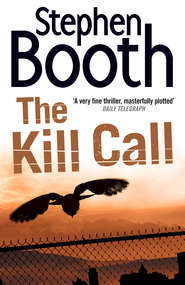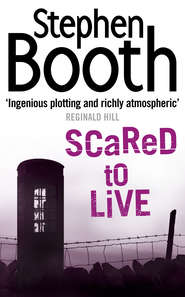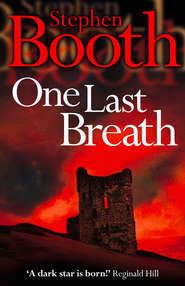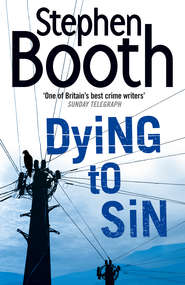По всем вопросам обращайтесь на: info@litportal.ru
(©) 2003-2024.
✖
Black Dog
Автор
Год написания книги
2019
Настройки чтения
Размер шрифта
Высота строк
Поля
4 (#ulink_2e870ee3-8d36-53f9-b1d5-a0917adebf8c)
The E Division Police Headquarters in Edendale had been new once, in the 1950s, and had even earned their architect a civic award. But in the CID room, fifty years of mouldering paperwork and half-smoked cigarettes and bad food had left their mark on the walls and their smell in the carpets. The Derbyshire Constabulary budget had recently stretched sufficiently to decorate the walls, replace the window frames, and install air conditioning in some of the offices. They had also replaced the old wooden desks with modern equivalents more in keeping with the computer equipment they carried.
DC Diane Fry was reading the bulletins. She had started off by catching up with the fresh ones for the day, then had continued casting back over recent weeks. Her intention was to make herself familiar with all the current enquiries in the division. Although she had been in Edendale nearly two weeks, she still felt as new as the white glosswork that for some reason was refusing to dry properly on the outside wall near the window. All the windows on this side of the building looked down on Gate C and the back of the East Stand at Edendale Football Club, a team struggling in the lower reaches of one of the pyramid leagues.
The priority problem of the moment was car crime at local tourist spots. From the weary tone of some of the memos Fry came across, it sounded as though it always was the priority problem in E Division at this time of year. Many thousands of visitors were drawn into the Peak District National Park during the summer, bringing with them what appeared to be their own crime wave, like the wake trailing behind a huge cruise liner. These visitors left their cars at remote spots, in makeshift car parks on rough ground, in abandoned quarries and on roadside verges. The cars were invariably full of cameras and binoculars and purses stuffed with cash and credit cards, and God knows what else. At the same time, travelling criminals from the big conurbations around Sheffield in the east and Manchester in the west were touring the Peak District looking for just such victims. A few minutes with an unattended vehicle and they were away back to their cities, leaving a trail of distraught visitors and ruined holidays.
It presented an apparently insoluble problem. It was impossible to get the message across to the car owners, since they were a constantly changing flood – here one day, then moving on the next, to be replaced by another group of visitors. It was impossible for the police to keep surveillance on vulnerable sites with the resources available; it was feasible only to identify possible perpetrators and ask neighbouring forces to keep them under observation. It was called living in hope.
Diane Fry looked across the room at DS Rennie. He was on the phone, and had been for some time. She couldn’t hear what he was saying, but she was fairly sure he hadn’t yet taken a single note with the ballpoint pen he was chewing. He was thick-shouldered and thick-necked, a veteran prop forward in the divisional rugby team, as she had learned from his conversation with one of the other DCs. She also knew that Rennie’s first name was David, and that he was married with two children in their early teens.
She had soon become aware of his sly sideways appraisal, a slithering of the eyes towards her when he thought she wasn’t looking. She had observed this in the past to be a common tentative first manoeuvre towards a junior female colleague, designed to culminate in an office affair. Many men, of course, never got past this first sign – it was more an indication of hope than intention. But there were others who were more of a nuisance, and Fry couldn’t tell just yet which Rennie was. It was helpful, though, to have the early warning, so that she could decide on her own terms when the time was right to put him down. Affairs with colleagues were not on her agenda. Not at all.
She could see Rennie was not making the effort to appear busy, even though there was a DCI somewhere in the building and liable to appear in the CID room at any moment.
‘Sarge?’ said Fry, when at last he put the phone down.
Rennie looked round, as if surprised that she was still there. Then he smiled, contorting his face until it was almost a wink. His tie was something dark green, with a small gold crest, and his suit was a good cut for his heavy shoulders, but not recently cleaned. He pulled out a bar of his habitual chewing gum, which Fry had guessed might mean he was a reformed smoker.
‘What can I do for you, Diane?’
‘This project group looking at the auto crime figures.’
‘Yeah?’
‘I wondered if a check had been done on the computer. Matching up locations and timings. An analysis of MOs. We could set up a computer model.’
‘Ben Cooper usually does that,’ said Rennie. ‘You’d better not mess with the computer until you’ve asked him about it.’
‘A computer model could come up with a set of predictions, suggest target locations. It’s worth a try, Sarge.’
‘I told you, speak to Ben. They’ve got him out at Moorhay, but he should be back in the office later, thank God.’
Fry had already heard Ben Cooper’s name several times during her first week in Edendale. Apparently he was some paragon of all the virtues who knew everything. DC Cooper knew the area like the back of his hand, they said. He knew all the local villains and even their families, they said. He knew how all the systems in the CID office worked, too. He knew exactly how to fill in the vast quantities of paperwork that baffled other detectives. Now, apparently, he was the only one who knew how to use the computers. But Diane Fry had an information technology qualification to her name, and she had done a course on intelligence data analysis at the National Crime Faculty in Bramshill. At the first opportunity, she would show them who knew how to use the computers around here.
For now, though, she decided to try another tack.
‘Someone from the NCIS did a paper on this problem a few months ago. It was mentioned when I was at Bramshill.’
‘Really?’
Rennie sounded uninterested.
‘The National Criminal Intelligence Service.’
‘I know what the NCIS is, thanks.’
‘I wondered if someone had researched it. I can’t see any mention in the paperwork. Maybe the project group have followed it through?’
‘I doubt it.’
‘I’ll look it up, if you like, Sarge.’
Rennie looked sour, pulled at his tie, scrabbled about on his desk for a bit of paper and picked up the phone to dial another number.
‘Shall I, Sarge?’
‘Oh, if you like.’
Fry made a note for herself in her notebook and asterisked it. Then she put the car crime reports aside and picked up that morning’s bulletin on the missing girl, Laura Vernon. She had already read it once and had memorized its admittedly sketchy details.
Her memory was excellent for jobs like this. She knew exactly what the girl had been wearing when last seen, down to the blue pants and the size-five slim-fit Reeboks. If she was the first officer to come across any of these items, she knew she would recognize them straightaway. But she would have to be allocated to the search first, of course.
All available hands had already been called to the task of finding Laura Vernon. All hands, that was, except Detective Constable Diane Fry and Detective Sergeant David Rennie. Fry was new to the division, of course, but what had Rennie done wrong? He was currently in charge of day-to-day crime in E Division, and Fry constituted his staff. It wasn’t a combination that looked likely to crush any crime waves. At this moment, they weren’t even trying.
Fry got up from her desk and walked over to check the action file on the Laura Vernon enquiry. Although the enquiry was less than forty-eight hours old, the file was already getting thick. The apparatus of a major enquiry was beginning to swing into operation, even though it hadn’t yet been designated a murder enquiry – not until a body was found. Teenage girls ran away from home all the time, of course, and generally turned up a few days later, hungry and shamefaced. Laura had money – her parents estimated there could have been as much as thirty pounds in her purse; obviously she was not a girl who was kept short of cash. But she had taken no clothes and no possessions with her. That was a significant factor.
And reactions had been quicker in this instance for two other reasons. One was the fact that a witness report had placed Laura Vernon talking to an unidentified young man behind her house shortly before her disappearance. It had been the last sighting of her for nearly two days now.
The other pressing reason, understated in the action file but discernible as a thread running through the reports, was the so far unsolved murder of sixteen-year-old Susan Edson in neighbouring B Division a few weeks earlier.
Everyone knew that the first two or three days of an enquiry were vital, if it did turn out to be a case of murder, or other serious crime. Within the first seventy-two hours the memories of witnesses were fresh, and the perpetrator had little time to dispose of evidence or construct an alibi. At the same time, speedy action also meant they had a better chance of finding Laura Vernon alive.
Fry was interested to see that a name had been offered up to police as a ‘possible’ right from the start. A youth called Lee Sherratt had been named by the parents and had been interviewed by officers in the initial sweep. He had denied being the young man seen talking to Laura, but his alibi was unsupported. Sherratt’s record had been pulled from the Police National Computer – a few petty crimes, some as a juvenile. It wasn’t much, but it was enough to leave his name at the top of the file until he could be eliminated.
According to the reports, a uniformed inspector from Operational Support was now in charge of the search on the ground. DI Paul Hitchens was CID investigating officer, reporting to Detective Chief Inspector Stewart Tailby. Officers had already called at every house in the village of Moorhay, since there weren’t all that many. Enquiries had been made with all known friends and relatives in the area. No sign of Laura Vernon, no leads to her possible whereabouts.
By now the painstaking inch-by-inch search of the surrounding countryside was well under way – off-duty officers had been called in, the search dog teams were out and the helicopter was in the air. Peak Park Rangers and Countryside Rangers were helping the search, and the Mountain Rescue Team was somewhere up on the tops of the moors above the village. And, of course, Detective Constable ‘Mr Perfect’ was also out at Moorhay in person. Case solved, then.
Fry had met DI Hitchens on her first day. He was her CID boss – after DS Rennie, anyway, and she had already decided Rennie didn’t really count. Hitchens was younger than the sergeant, and better educated. So an early promotion; maybe he was a fast-track graduate, like herself. He would certainly be destined for higher things, and his voice would be listened to by more senior officers. Fry ached to be out there, on a major enquiry, at the right hand of DI Hitchens, getting the chance to impress. She wasn’t intending to hang around looking at car crime statistics for long. A murder enquiry was just the thing. But it had come too soon, while she was still too new. Hence her presence in the office with Rennie.
In an hour or two they would have to call off the search for Laura Vernon anyway. Even in August dusk fell eventually over the hills, and the lines of men and women would disperse and wander dispiritedly home. Tomorrow there would be appeals in the papers and on TV, and civilian volunteers would be queueing up to swell the numbers of the search parties.
Fry knew she had two choices. She either coasted along and filled in time until Rennie thought fit to allocate her some tasks; or she could speak up, take the initiative, start to show what she was made of. But she held her tongue. Now was not the time – she needed to be in a stronger position. Meanwhile, DS Rennie was not worth the effort of trying to impress.
Then the door opened and DI Hitchens put his head round. ‘Who’s here? Oh yes.’
He looked disappointed, like a captain left with the choice of the players no one wants when the teams are being chosen. Hitchens was in his shirt sleeves, with his cuffs rolled up a few inches over strong wrists covered in dark, wiry hair. He was in his thirties, and seemed to be permanently about to break into a smile. Fry caught his eye, looked from him to Rennie, who had barely moved except to shift his foot from his desk.
Hitchens nodded. ‘All right to hold the fort for a while, Dave?’
‘Sir.’
Fry jumped up eagerly. ‘Where are we going, sir? Is it the missing girl, Laura Vernon?’
‘What else? Yes, we’ve had a find called in. We’ve got a good man out in the field now checking it out, but it sounds positive. Can you be ready in two minutes?’
‘I’ll be ready.’











